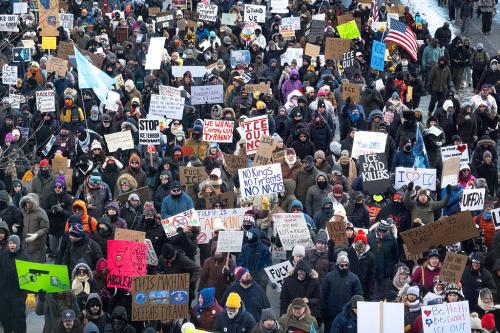Executive Summary
The Obama administration has committed itself to immigration reform. Yet despite all the shortcomings of current policy — threats to the rule of law, exploitation of vulnerable newcomers, real and perceived competition with Americans for jobs and public resources — reasonable compromise on immigration will be exceedingly difficult. The divide between elite and public opinion on this issue remains deep and wide. It is a critical factor in the lack of trust that pervades today’s political culture.
This distrust was readily apparent in November 2008 when the Immigration Policy Roundtable first convened its twenty participants. The Roundtable is a joint undertaking of the Brookings Institution and the Kenan Institute for Ethics at Duke University. The group’s distinctive feature is that its members came to the table with divergent, often conflicting perspectives on immigration. In fact, the range of political and ideological views represented at the Roundtable is unprecedented in recent immigration policymaking.
Some of us were clearly attuned to the opportunities and realities of an increasingly interconnected global economy, which necessarily involves substantial movements of workers and their dependents around the world. Others of us were just as clearly concerned with the domestic costs and strains precipitated by these global forces.
Some empathized with Americans who are outraged that immigration law is not enforced, and is even being flouted. Others held that as currently written, our immigration laws are unworkable and must be reconciled with social and economic realities.
During our deliberations, we came to recognize that we would never resolve our principled disagreements. Nonetheless, progress at the policy level turned out to be possible, and the results fruitful. In the end, we were able to agree on a set of recommendations that address the most vexing and controversial issues stymieing immigration reform.
Reduce Illegal Immigration by Linking Workplace Verification and Legalization
The Roundtable’s approach to illegal immigration emphasizes the enforcement of immigration law at the workplace and a simultaneous effort to move illegal immigrants toward legal status. We propose a legalization program that would allow unauthorized workers who have been in the country for five or more years to start down a path to legalization. But this process would not proceed until a workplace verification system, authorized and funded by Congress, reaches an agreed-upon level of use and effectiveness that would be certified and continuously monitored by the Government Accountability Office.
Reorient Immigrant Admissions Criteria
We must reorient the nation’s immigrant admissions criteria to better serve Americans and our economic goals. Family unification should remain a bedrock principle of U.S. immigration policy, but we believe that “family” must be narrowed to mean nuclear family members. We must also recognize that in today’s increasingly competitive and technology-intensive global economy, educated workers with the knowledge and skills to innovate are critical. Therefore, we recommend increasing skilled visas and replacing per-country limits on skilled visas with a single overall limit. At the same time, we recommend holding constant, at least for the present, the overall number of permanent legal residents admitted annually.
Rationalize Temporary Worker Programs
The nation’s array of temporary work-based visas is highly adaptive and responsive to employer needs, but it lacks overall coherence and is generally beyond public scrutiny. We recommend increased oversight of temporary worker programs and replacing temporary visas with non-renewable, five-year provisional visas that do not tie workers to a single employer. Provisional visa holders should have the option of achieving permanent status.
Establish an Independent Standing Commission on Immigration
The Roundtable proposes creation of an independent Standing Commission on Immigration to provide the deliberative forum that immigration policy has lacked. Bipartisan commissioners would be appointed by the President and confirmed by the Senate for staggered terms of at least seven years. The Commission would be supported by a permanent professional staff, issue reports and studies on many aspects of immigration policy, and biennially recommend overall visa category ceilings for congressional review and action.
Promote the Assimilation and Integration of New Americans
The Roundtable also recommends creating an Office of New Americans (ONA) within the Executive Office of the President to oversee and coordinate public/private sector efforts to integrate and assimilate immigrants into American society. ONA should encourage effective methods for teaching English, involving parents in their children’s education, and incorporating core civic principles and U.S. history in naturalization preparation.
Engage Mexico
Mexico is the largest contributor to current U.S. immigration. The U.S. shares a lengthy border with Mexico as well as many common concerns. The Roundtable recommends that the United States create or invigorate institutions for regional cooperation and investment, bolster interdiction of illegal arms and drugs, support security and judicial reform in Mexico, and cooperate closely on law enforcement and a range of other border issues, including immigration.
Because the Roundtable’s final report is the output of a diverse group, each member does not necessarily agree with every detail. We never sought and did not reach consensus. Yet each of us does concur that we have struck a reasonable balance between competing considerations, interests, and principles and that our result is a major advance over the status quo. And while we are under no illusion that the task we set for ourselves is as daunting as what confronts our elected officials, we do believe that our deliberations and the compromises struck offer a blueprint for progress on one of the most divisive issues our country faces.
The Brookings Institution is committed to quality, independence, and impact.
We are supported by a diverse array of funders. In line with our values and policies, each Brookings publication represents the sole views of its author(s).


